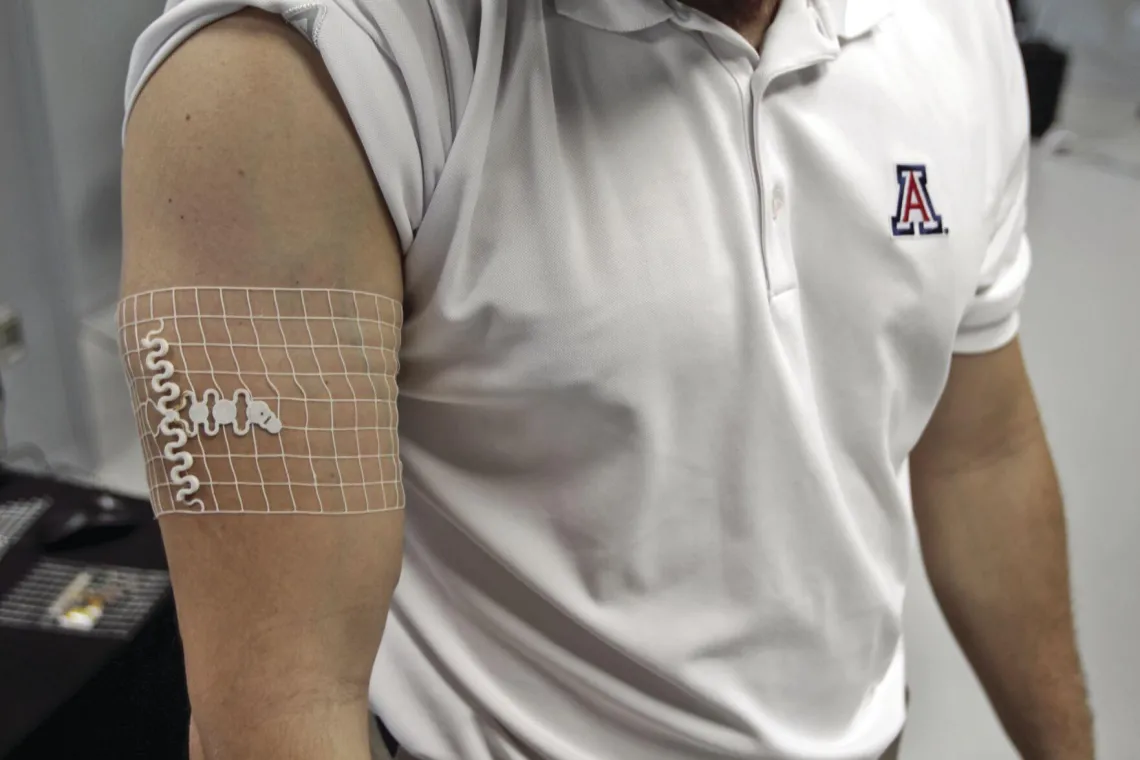UA shows off medicine, music and more at new Sensor Lab

A researcher wears a wirelessly powered sensor that can track health data 24/7.
Jeff Gardner
For decades, academic research led to the newest cutting-edge technology. But now, cutting-edge technology is leading academic research. On Tuesday, March 22, the University of Arizona celebrated the grand opening of their Sensor Lab, a high-tech research facility based around human physiology and behavior.
Under the UA Health Sciences umbrella, the Sensor Lab has virtual reality, wearable sensors, 360 video, and other technologies that can provide unique research for a variety of fields. The lab supports university faculty and students, but is also available for investors and local companies interested in developing custom technologies.
Projects at the Sensor Lab range from virtual reality for training at the UA College of Nursing, to wearable sensors for remote tai chi lessons for older adults, to augmented art where dancers can interact with projections.
“I would say our strength here is in sensor-based research where we provide expertise and connections and the possibilities for the different departments to work together,” said Sensor Lab coordinator Gustavo Almeida. “We bring together capacities that might otherwise be difficult to organize. Not only could there be unexpected outcomes in the research, but unexpected applications.”
The UA College of Engineering showed off two research programs out of the Sensor Lab. The first is a series of 3D-printed wearables that can track health data, similar to a FitBit. However, these custom wearables are designed to detect frailty in elders, and can be wirelessly charged. The wearables are wirelessly powered from a battery from up to two meters away, but when out of range, they can operate for roughly eight hours.
“Frailty is actually quite a big problem, but it might not be too prevalent in people’s minds. And people can have really bad outcomes if it’s not caught early. But if you do catch it, you can improve quality of life and extend life. However, it’s a very gradual process that can be hard to detect early,” said assistant professor of
biomedical engineering Philipp Gutruf. “So we’ve developed sensors that people can wear home or to work, and we can get 24/7 health data that is much more complex than what you’d get from a FitBit.”
The second engineering project is a robot arm with tactile sensation that allows surgeons to have “superhuman sensing.” The robotic arm is designed to detect things like tissue durability and heat in a way that human senses cannot. Although neither of these research projects are being used outside of the lab, real-world medical practitioners are getting to experiment with them.
“Because the Sensor Lab is right next to the hospital, all the surgeons can come here and try out the robots and practice. We monitor them closely, and can then assess how well these devices work in assisting them,” Gutruf said. “In this Sensor Lab, we have a very controlled environment that allows us to train our algorithms to do diagnoses very precisely… This is a great place with a variety of projects, but they all have the sensors in common. The focus is on the capabilities we can bring to these projects with this new facility.”
The Sensor Lab centers around new research, but also on the development of new types of sensors. According to Jennifer Barton, professor of engineering and optical sciences, if there’s a company developing a new type of sensor, the lab can provide a space to do so and also examine other available sensors currently on the market.
“We can reconfigure spaces to be like a hospital room, for example. This is a really unique space that would be really hard to have anywhere else,” Barton said. “Having that large array of sensors is great, not only for the ones that are commercially available, but also for experimental sensors… These types of collisional activities are great for having fresh perspectives.”
Article Source: https://www.insidetucsonbusiness.com/news/ua-shows-off-medicine-music-an...

